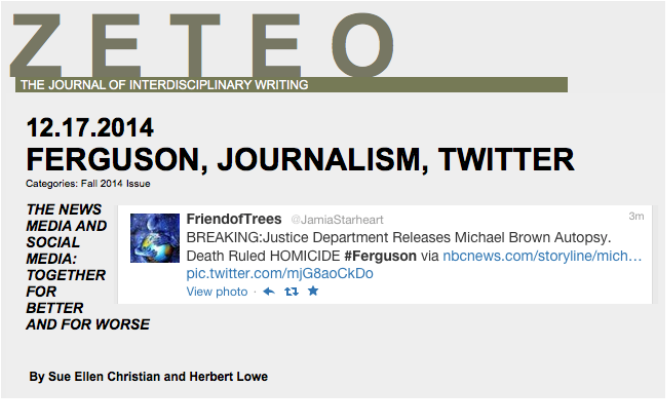Our own evaluation of the performance of traditional and social media in the Ferguson story is mixed. News consumers have had access to great reporting and predictable, tablet-thin coverage, as well as to a powerful social-media movement that has roiled the Twittersphere with posts both smart and stupid. Twitter and the news media will be intertwined for some time as the story in Ferguson and related police shootings and protests, in New York and elsewhere nationwide, continue to be broadcast via hashtags. ... What follows relates to how, in a sense, and even if unintentionally, traditional and social media worked together to report what happened in Ferguson. We will first address Twitter’s most salient contributions, then traditional media’s, and then similarities between the two.
My key concern was fairly contributing to the collaboration given my returning that same week to teaching for the first time in a year – and in the coming weeks having to facilitate the second annual O'Brien Fellowship in Public Service Journalism conference, keynote a NAACP banquet in Illinois and do a presentation on digital branding at the University of Wisconsin-Parkside. Thankfully, Christian and the Zeteo editors were very patient and helpful. I learned a great deal through the process and hope to work with my co-author and the editors again soon.
Did I say this is my second journal article? Here's a blog post about the first one, "An Online Hoax Reminds Journalists to Do Their Duty," published in the "Journal of Mass Media Ethics" in 2012. With these academic works and my graduate school thesis now behind me, I am looking forward to my next opportunity to do something scholarly. What and when will it be?
How Twitter affected the news media's coverage of Ferguson - published today. http://t.co/Ods2aAtzmm @ZeteoJ @herbertlowe #WMU #Ferguson
— Sue Ellen Christian (@sechristian1) December 17, 2014 Thanks for the hat tip, @marissaaevans. @herbertlowe @ZeteoJ
— Sue Ellen Christian (@sechristian1) December 18, 2014 
 RSS Feed
RSS Feed
